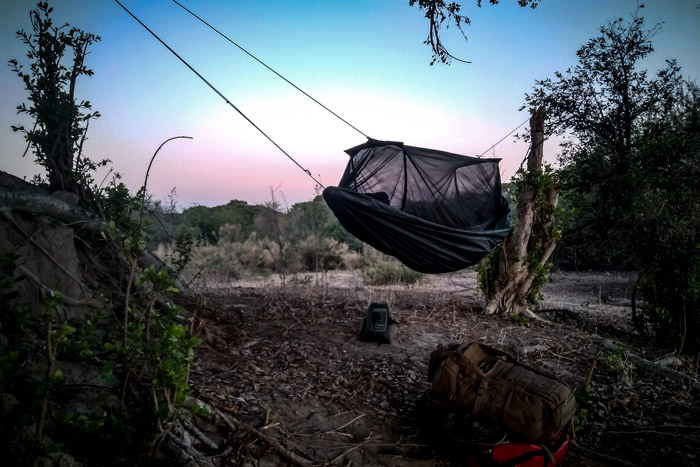Denton Joachim, a Peace Parks Foundation Geographical Informations Systems (GIS) Technician, is regularly sent out to train field staff in several southern African transfrontier conservation areas. His work takes him well off the beaten track, often to extremely remote parks and reserves. His most recent trips took him to Nyika National Park in the Malawi component of the Malawi-Zambia Transfrontier Conservation Area (TFCA), and the Habu Community, which is in the Botswana component of the Kavango Zambezi TFCA

A good night's sleep before a day of conservation training with SMART technology
Denton’s training focuses on teaching conservation professionals to work with SMART, the Spatial Monitoring and Reporting Tool that makes it possible to collect, store, analyse and communicate patrol-based data on illegal activities, patrol activities and wildlife. “The information gathered is used to build an understanding of where efforts should focus, how to adapt to changing conditions, as well as to evaluate ranger performance, so accurately capturing and analysing the data is extremely important,” says Denton.

Training is conducted in the field at the conservation area site. For Denton, it is a privilege to teach these types of skills to the rangers and try and help them be more effective in their work of protecting the environment.
During the Botswana training trip, accommodation was very limited, as is often the case in remote conservation areas where camps and other tourism infrastructure are still in the process of being developed. This does not, however, prevent the Peace Parks team from effectively doing their work, as they see an adventure where others might see an uncomfortable night ahead.
“With the Botswana trip,” says Denton, “the training was offered in a small village and there was no accommodation for us. The course attendees all stayed at their homes, so we camped.
It was the first time I stayed in a hammock for an extended period, nine nights in total. It was amazing, as the wind would rock you to sleep while listening to the cowbells of cattle wandering around in the bush. The double-layered design, breathable base and built-in mosquito net worked wonders in the Botswana summer,” says Denton. The hammock and tarp system which provides rain cover is always in Denton’s laptop bag when he travels, even when he has accommodation booked. He says, “it gives me a lot of comfort knowing that I can sleep anywhere, even in accommodation without mosquito nets, as I could just put the hammock on the bed using its net for protection.”

The thin mosquito net provided peace of mind knowing that insects, snakes and spiders would not find a home in Denton’s suspended home. The tarp, which provided protection from the rain, served as a little roof giving him the sense that he was sleeping in a little house, where he could safely relax away from predators.
Denton also made use of a Kelly kettle system, which made cooking (and the critical access to caffeine) much easier. The system uses significantly low amounts of natural fuel making it possible to prepare a quick meal using only twigs.

Martinus Victor, owner of Overland Solutions who generously donated the hammock and kettle, says, “We support and happily donated towards Peace Parks Foundation. The work that they are doing is phenomenal and is essential to ensure the sustainability of our wildlife. Peace Parks Foundation is helping secure a safe environment for South Africa’s fauna and flora and in doing so they are giving our future generation the opportunity to enjoy our heritage.”

Denton's sleeping set up during training! Conservation is made easier through training and technology.
Through this training, community scouts, field rangers and administrators gained valuable insight into data collection processes and analysis using the SMART system. Park administrators will now be able to use the system more effectively to generate reports and deal with data management and queries, all of which will greatly benefit long-term strategic decision-making in these protected areas.
As Peace Parks Foundation is part of the SMART (Spatial Monitoring and Reporting Tool) partnership, team members regularly provide training to new and existing SMART users involved in anti-poaching and other conservation efforts. SMART is a unique example of a global conservation NGO partnership that includes Frankfurt Zoological Society, Global Wildlife Conservation, North Carolina Zoo, Panthera, Peace Parks Foundation, Wildlife Conservation Society, Wildlife Protection Solutions, World Wildlife Fund, & the Zoological Society of London
Many thanks to Denton and the team at Peace Parks for sharing their inspiring story with us. We are privileged that our products are being used as part of such a wonderful project!
If you want to find out more about the amazing work that Peace Parks do, take a look at their website here. Planning your own long-term trip into the wilds? Check out our Online Store for the complete range of DD products.

 All Hammocks
All Hammocks Core Hammocks
Core Hammocks SuperLight Hammocks
SuperLight Hammocks Multicam Hammocks
Multicam Hammocks Hammock Suspension
Hammock Suspension Hammock Insulation
Hammock Insulation Hammock Accessories
Hammock Accessories All Tarps
All Tarps Core Tarps
Core Tarps SuperLight Tarps
SuperLight Tarps Multicam Tarps
Multicam Tarps Tarp Suspension
Tarp Suspension Tarp Accessories
Tarp Accessories Cordage
Cordage All Tents
All Tents SuperLight Tents
SuperLight Tents Multicam Tents
Multicam Tents Tipi Tent
Tipi Tent Tent Accessories
Tent Accessories Multicam
Multicam Recycled
Recycled SuperLight
SuperLight Junior Range
Junior Range Sleeping & Insulation
Sleeping & Insulation Rucksacks
Rucksacks Clothing
Clothing Accessories
Accessories Special Offers
Special Offers DD Festive Offers
DD Festive Offers


 DD Hammocks
DD Hammocks DD Tarps
DD Tarps DD Tents
DD Tents DD Hammocks Outdoor Clothing
DD Hammocks Outdoor Clothing